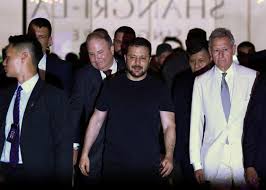Rockstar entrances are designed to demand attention, and that’s precisely what Ukrainian President Volodymyr Zelenskiy achieved when he arrived at the Shangri-La Hotel to attend the premier Asian defense summit in Singapore. Dressed in his trademark green T-shirt and military trousers, flanked by bodyguards, Zelenskiy’s arrival was reminiscent of a high-profile celebrity making a grand entrance. But this was no concert; it was a critical moment in international diplomacy.
Zelenskiy’s Arrival: A Statement in Itself
The Image of a Leader
Zelenskiy’s choice of attire—a simple green T-shirt and military trousers—was not just about comfort; it was a statement. This attire, which has become synonymous with his leadership during the war, projected resilience and solidarity with his troops. It was a visual reminder of the ongoing struggle in Ukraine, meant to evoke empathy and support from the summit’s attendees.
Security and Symbolism
Flanked by bodyguards, Zelenskiy’s entrance was meticulously choreographed to ensure both security and symbolism. His entourage underscored the seriousness of his mission and the high stakes involved.
The Message: Rallying Asia’s Support
A Call for Unity
Zelenskiy’s primary goal was to rally support from Asian nations for Ukraine’s fight against Russian aggression. He aimed to highlight the universal struggle for democracy and the urgent need for global solidarity.
Challenges in the Pitch
However, the pitch faced significant challenges. Many Asian countries have complex relationships with both Russia and the West, making them cautious about taking sides. This geopolitical balancing act has often resulted in a lukewarm response to appeals from either side.
Asia’s Role in the Ukraine Conflict
Historical Context
Historically, Asia has maintained a relatively neutral stance in the Ukraine conflict. This neutrality stems from a combination of economic interests, regional security concerns, and longstanding diplomatic ties with Russia.
Potential for Support
Despite this, there is potential for Asian countries to play a more active role. Economic sanctions, diplomatic pressure, and humanitarian aid are areas where Asia could contribute significantly without direct military involvement.
Why the Pitch Fell Flat
Timing and Prior Engagement
One of the critical reasons Zelenskiy’s pitch fell flat was timing. The conflict has been ongoing for over a year, and many Asian nations have already established their stances. Additionally, the perceived lack of prior engagement with Asia by Zelenskiy and his Western partners has led to skepticism about the sudden call for support.
Cultural and Political Differences
Cultural and political differences also played a role. The narrative of democracy versus autocracy, while compelling in the West, does not resonate as strongly in regions where governance models and historical experiences differ significantly.
The Broader Implications
Impact on Global Diplomacy
Zelenskiy’s attempt to garner support in Asia highlights the complexities of global diplomacy in the modern era. It underscores the need for nuanced approaches that consider regional dynamics and long-standing relationships.
Lessons for Future Engagements
For future engagements, it is crucial to build relationships early and understand the unique perspectives of each region. This approach can help in crafting more effective and resonant messages.
President Volodymyr Zelenskiy’s rockstar-like entrance at the Shangri-La defense summit was a bold move designed to capture attention and rally support for Ukraine. However, the complexities of Asia’s geopolitical landscape and the timing of the pitch resulted in a muted response. As the conflict continues, it is clear that nuanced, region-specific strategies will be essential in garnering broader international support.




